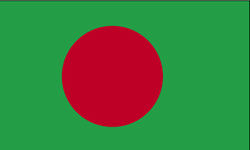
Bangladesh in Turmoil Over Proposed Anti-Blasphemy Law
A Special Report by ICC
04/18/2013
Washington D.C.
International Christian Concern
Amid rising political conflict, Bangladeshi Christians are relying on the government to resist the demands of Islamists for the introduction of a new anti-blasphemy law that could inflame Christian persecution.
On Apr. 6, Hefajat-e-Islam, a newly floated radical pro-Islam movement seeking to impose sharia law in the country, held a rally in central Dhaka with as many as half a million supporters, to declare its demands for a new anti-blasphemy law. The group has put forward 13 demands, viewed by liberals as Taliban-inspired, threatening the government with a siege on May 5, unless the demands are met.
But the demands are contrary to the constitution of Bangladesh - including the death penalty for anyone guilty of blasphemy; barring women from working with men; banning all cultural activities that defame Islam; reinstating pledges to Allah in the constitution; banning women from mixing freely with men and making Islamic education mandatory - an agenda critics say would amount to the "Talibanization" of Bangladesh, according to Reuters.
On Apr. 8, Prime Minister Sheikh Hasina took a stand against the protesters, saying, "They have demanded it. Actually, we don't have any plan to [bring in the law]. We don't need it. They should know that existing laws are enough." Calling Bangladesh "a secular democracy," she told the BBC, "So each and every religion has the right to practice their religion freely and fair. But it is not fair to hurt anybody's religious feeling. Always we try to protect every religious sentiment."
Hefajat-e-Islam's protest is backed by another Islamist outfit, the Jamaat-e-Islami, Bangladesh's largest Islamist party whose leaders are on trial for war crimes committed during the country's independence struggle in 1971. Two of its senior leaders have already been convicted by a special tribunal. Seven more are still facing trial.
The Jamaat-e-Islami is threatened by the demands of another ongoing protest, known as Bangladesh's Shahbag movement, which rails against Islamic war criminals belonging to the Islamic party, calling for justice to be served.
Violence, Protests and Arrests
Since the start of protests on Feb. 5, tens of thousands of people have been holding day-and-night vigils at Shahbag, refusing to leave until all those convicted of war crimes are sentenced to capital punishment. The Shahbag movement also demands that the Jamaat-e-Islami party should be banned from Bangladeshi politics, giving enough incentive for the Islamic party to demonize them and target them for extinction. From the rally led by Hefajat-e-Islam, a group of non-political Islamic scholars also demanded action against the "atheists and blasphemous bloggers" of the Shahbag movement.
On Feb. 15, Rajib Haider, one of hundreds of bloggers demanding the death penalty for Islamist war criminals, was attacked outside his home and hacked to death. His face was so lacerated with knives that a relative who found the body wasn't sure it was him until he called Haider's cellphone and heard it ring inside his pocket. On March 2, five Jamaat-Shibir activists were arrested and confessed their involvement in Rajib's killing.
Following the protests led by Hejafat-e-Islam, two youths were detained for allegedly making derogatory remarks about Islam on Facebook. Earlier in April, four bloggers were also arrest on charges of hurting religious sentiments.
The arrests prompted eight blog operators to black out their websites, with liberals accusing the government of yielding to Islamist pressure. But the prime minister dismissed those accusations. "No, [it's] not that. If anybody tried to hurt any sentiments of any religion or any religious leader, there is a law. We can take any action," she told the BBC.
More than 80 people have been killed in clashes in the last few months, most of them shot by police. Human rights groups have accused the security forces of using excessive force to control the riots. But the prime minister defended their actions and stood firm in her position against the protesters.
Politics and Religion
There is an obvious political slant to the conflict in Bangladesh. Every political and ideological group seems to have the upcoming parliamentary elections on their minds. With a majority Muslim population, the Jamaat-e-Islami party is trying to use religious fervor to draw Muslims to themselves, while the main opposition, Bangladesh Nationalist Party (BNP), is exploiting the existing conflict to cast doubt on the government, stating that it will not take part in any election under the incumbent government because it will not be free or fair.
As various political groups and ideologies clash in Bangladesh, Christians remain concerned over the possibility of the Islamization of their secular country. The minority Christians in Bangladesh and the global Christian community are looking to Prime Minister Hasina to persevere in her stand to firmly resist calls for the introduction of anti-blasphemy laws that are exploited in other Islamic countries for persecution of Christians with impunity.
What has been witnessed in other countries where Sharia law is enforced should be a deterrent for Bangladesh to protect itself from the threat of Islamization, which comes at the cost of far too many religious and civil liberties. Christians will be praying that the prime minister's resolve remains strong, hoping that increasing pressure and escalating tensions do not cause her to make a political compromise that might bring a short-lived peace, but only do long-term damage to the very soul of her nation.
For interviews, contact Corey Bailey, Regional Manager for Central Asia: RM-Asia@persecution.org
# # #
You are free to disseminate this news story. We request that you reference ICC (International Christian Concern) and include our web address, www.persecution.org. ICC is a Washington, D.C.-based human rights organization that exists to help persecuted Christians worldwide. ICC provides Awareness, Advocacy, and Assistance to the worldwide persecuted Church. For additional information or for an interview, contact ICC at 800-422-5441.
International Christian Concern
2020 Pennsylvania Ave. NW #241
Washington, D.C. 20006
www.persecution.org | E-mail: icc@persecution.org


 RSS Feed
RSS Feed